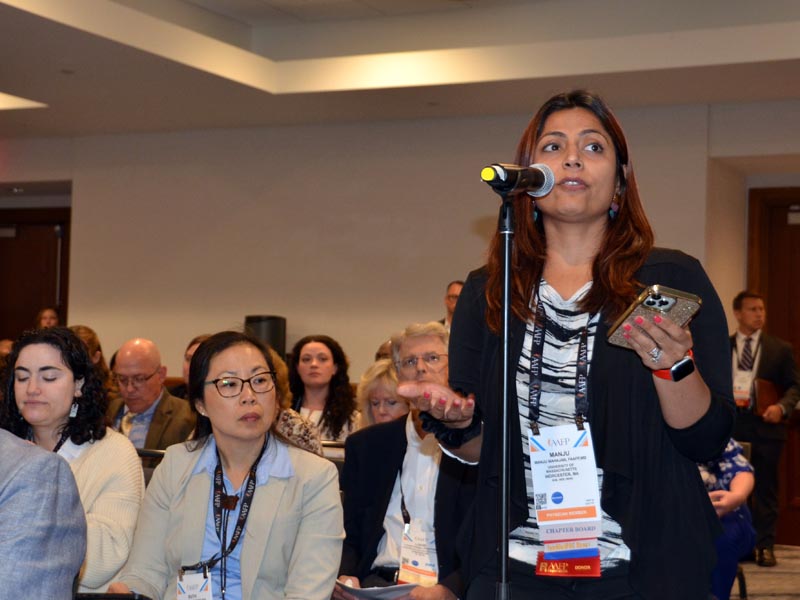Congress of Delegates Acts to Shape Future of
Family Medicine
Oct. 4, 2024, News Staff — The Congress of Delegates aimed to improve the health care landscape for family physicians and their patients when members met in Phoenix Sept. 23-25 and considered more than 40 resolutions addressing a broad range of issues.
Delegates and alternate delegates representing chapters; new physicians; residents; medical students; and member constituencies (women; members who are Black, Indigenous and other people of color; international medical graduates; and LGBTQ+ physicians or those who support LGBTQ+ issues); took up important topics that chapters raised in resolutions, as well as elected new leaders.
The COD, which is the Academy’s policy-making body, considered testimony that was submitted when the resolutions were open for comment from all members Aug. 23-Sept. 3, and testimony that members gave live for those issues that delegates asked to be taken up in additional discussions when the Congress convened in Phoenix. Delegates then voted on each measure — to adopt or not adopt the original resolution or a revised substitute, reaffirm it as current AAFP policy, or refer it to the Board of Directors for further consideration.
Members can review all of the COD’s actions on resolutions in the 2024 reference committee reports. Below are highlights of some of the key issues that were adopted from each reference committee:

Member constituency delegate Manju Mahajan, M.D., FAAFP, testifies at a reference committee hearing dedicated to issues on which delegates requested extra discussion.
Advocacy
Standardizing Paperwork: Delegates adopted a resolution asking the AAFP to advocate for a single, national, standard Family and Medical Leave Act form to reduce redundancy, ambiguity and physicians' administrative burden. Supporters said that although the Department of Labor has such a form, employers often ask for additional paperwork.
Coverage for Diabetes Prevention and Self-management: Delegates adopted a substitute resolution that asks the Academy to advocate for insurance plans to be required to pay for the National Diabetes Prevention Program and the Diabetes Self-management Program. Members testified about the programs' benefits and relatively low costs, and the reference committee noted that the AAFP broadly supports prevention efforts for chronic diseases.
Reforming the Medicare Annual Wellness Visit: Another substitute resolution delegates adopted asks the AAFP to advocate for the Medicare annual wellness visit to be done by the patient’s usual source of care or primary care team, and to work with CMS to assess evidence about how the AWV can be carried out in the most cost-effective, efficient way to increase quality of life.
Health of the Public and Science
Pain Management of Office-based Gynecologic Procedures: Delegates adopted a resolution asking the AAFP to update policies to reflect that it is the standard of care to address — and to counsel patients about option for controlling — pain and anxiety during office-based gynecologic procedures, including insertion of IUDs; to offer members education on performing paracervical and cervical blocks; and to work with other organizations to advocate for better pain guidelines for office-based gynecologic procedures.
Flexible Timing for Annual Physicals: Delegates requested that the Board consider a resolution that would advocate for payers to cover an annual physical visit once per calendar year, rather than the current common rule of one year plus one day after the previous physical. The change would not only enhance patient care, members testified, it would also reduce administrative burden.
Organization, Finance and Education
More Education and Resources on Harm Reduction: Delegates adopted a substitute resolution that asks the AAFP to support harm reduction education as a component of the competency-based curricula taught by all medical schools and residency programs, and to offer more educational opportunities focused on harm reduction as a component of medication-assisted treatment for substance use disorders.
Investigate Why Family Physicians Leave the Workforce: Another substitute resolution that delegates adopted requests a study by the Academy to determine key reasons why family physicians leave the workforce, so the Commission on Membership and Member Services can review the data and make recommendations.
Practice Enhancement
Physician Unionization: Delegates adopted a substitute resolution asking the Academy to conduct a study on the issue of physician unionization that examines the history and current state in the United States and elsewhere, risks and benefits of different types of unions, similarities between unions and professional organizations such as the AAFP, best practices on topics including incorporating member benefits that unions traditionally offer, and legal and practical barriers.
Better Patient Attribution in Health Plans: Delegates adopted a resolution that asks the AAFP to advocate for standardized guidelines and requirements for health plans to improve accuracy, transparency, timeliness and fairness of processes and methodologies for patient attribution; to advocate for formal mechanisms that allow physicians to verify and correct attribution data; and to give members resources that help address patient attribution problems in their practices.